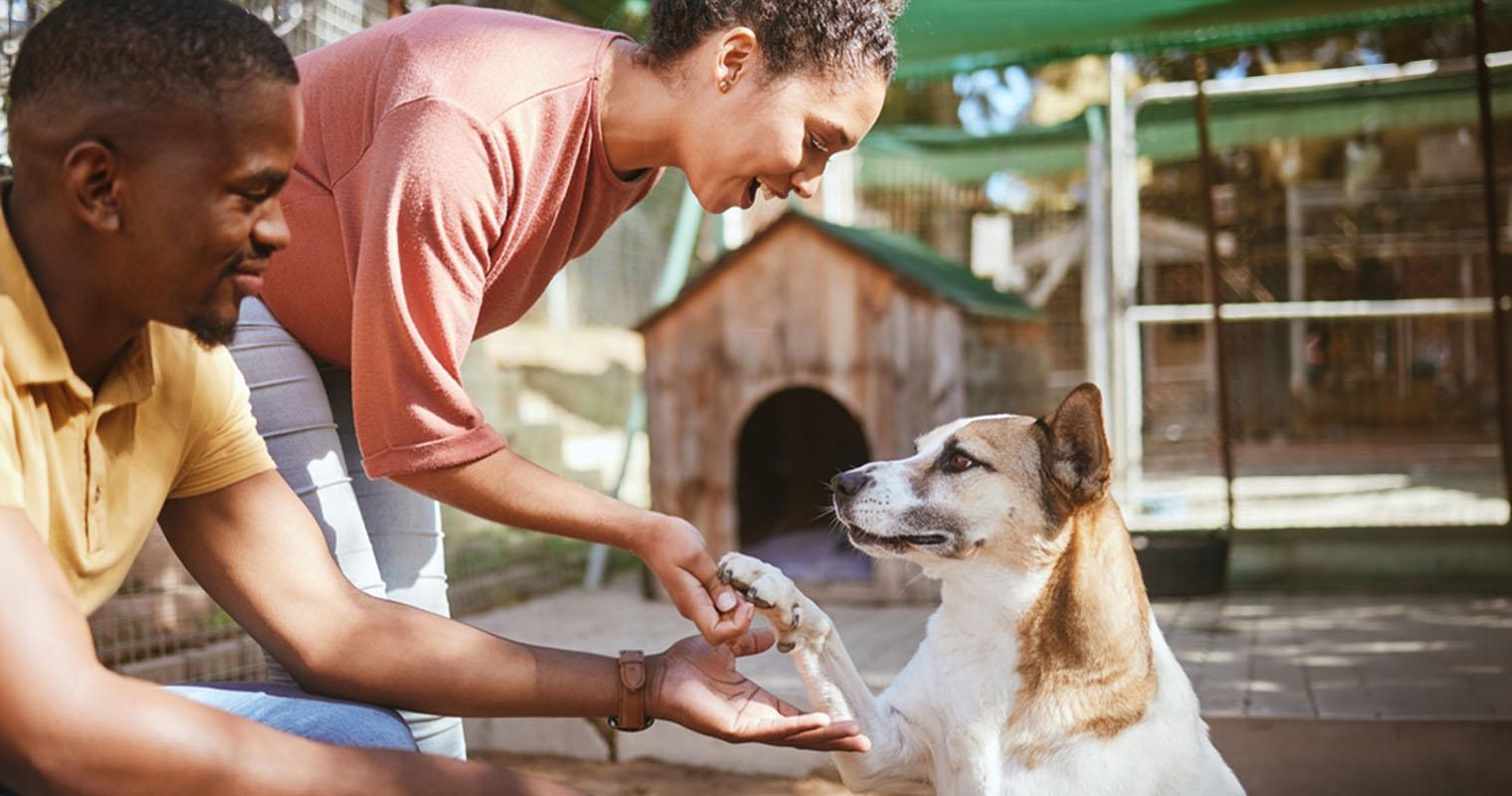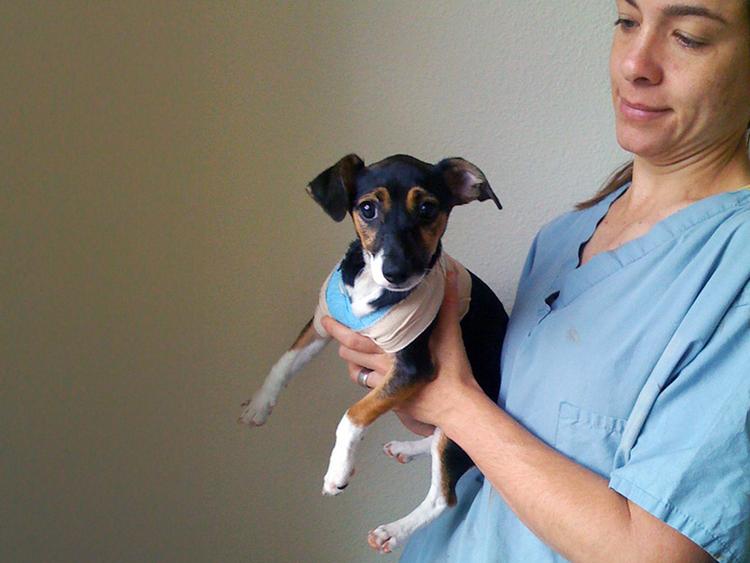Pet Adoption: How To Find A Pet Rescue?
Looking to adopt? Here are some helpful guidelines on finding a reputable pet rescue organization.
Looking to adopt? Here are some helpful guidelines on finding a reputable pet rescue organization.
by Savannah Admire, | March 14, 2023

PeopleImages: Yuri A / Shutterstock
You’ve decided to adopt a dog or cat, and you’re ready to find a new pup and give them a loving home. But how do you choose the right rescue organization or shelter? Are all organizations the same? Learn how to find the best animal shelters and rescue organizations in your area so you can give an animal in need a forever home.
An animal rescue organization is generally a nonprofit entity. These organizations are funded entirely or primarily by donations and often pull animals from municipal shelters to provide them with the medical care they need and help them find homes.
A shelter is usually funded by city or state tax dollars and is often where dogs and cats found as strays go. Shelter examples often include your local humane society or animal control department.
Both types of organizations have animals for adoption and work to help limit the population of homeless pets, educate the public about the importance of spaying and neutering, and match pets with loving families.
Choosing a reputable animal rescue organization is just as important as choosing the right pet for your home and lifestyle. Local and national rescue organizations work hard to find homes for the animals in their care and deserve your support. You don’t want to give your money to an organization that is only looking to profit and doesn’t properly care for their animals. These groups give legitimate animal rescue organizations a bad name and can damage the cause of animal welfare.
When researching an animal rescue organization, look for a transparent and comprehensive website. The best animal rescue organizations have a board of directors, a large roster of trained volunteers, animals that appear well cared for and healthy, and clean and organized facilities. You can also look for the following:
A reputable rescue organization will be a registered 501(c)(3) charity, which means they are a nonprofit organization exempt from federal taxes. You can find out if an organization is registered as a nonprofit by visiting charitynavigator.org or the BBB Wise Giving Alliance.
A good shelter or rescue organization will be fully transparent about their operations, facilities, and the care they provide. They will have a website or other online presence where you can learn about their mission, policies, and animals they have available for adoption. Staff will answer your calls and emails and be happy to answer questions about the number of adoptions they complete each year, their foster homes, their annual budget, and their spay/neuter policies.
A reputable rescue organization will have a good reputation in the community. You can ask your veterinarian, friends, or family members for recommendations, and you should see the organization present at local adoption events and other community activities.
Many animal shelters and rescues use foster homes instead of kennels so the animals in their care can get more attention and socialization before they are adopted. Some rescues operate entirely out of foster homes and have no facilities at all. The organization should comply with local restrictions on the number of animals allowed per household and any other laws around running a shelter.
A reputable rescue organization will charge a reasonable adoption fee. This fee helps to cover the cost of caring for their animals and helps to ensure that they are going to a good home. The organization will also be open about what these fees cover, such as spaying or neutering and microchipping.
A legitimate and reputable animal rescue organization should have a clear mission, and goals focused on animal welfare and work to advocate for the animals in their care at all times. They should also have complete transparency in their operations, policies, and financial information; adequate staff or volunteers to ensure individualized attention and care for all animals; and proper veterinary care and support from a local veterinary office. The organization should also be willing to collaborate with local authorities and other reputable animal welfare organizations and have a presence at adoption events and sound business practices.
A reputable organization’s adoption process should include screening potential adopters to ensure the animal’s well-being in their new home. They should also offer follow-up support for adopters and allow adopters to return their adopted pet if necessary.
The biggest red flag for an animal rescue organization is a lack of transparency. If they are hard to contact or won’t answer questions about their organization or operations, you’re likely dealing with an unscrupulous individual or organization. You should also look out for signs of a bad animal rescue, such as poor living conditions for the animals, such as overcrowding, unsanitary environments, or neglect.
The adoption process should be thorough, and insufficient screening of potential adopters is definitely a warning sign of a less-than-reputable organization. In addition, if an organization charges high fees for all animals, regardless of age, or requests additional money from you, they’re likely not a registered nonprofit. They should be willing to answer your questions or address concerns and provide consistent information about their activities and the animals available for adoption.
“Look online before adopting from any shelter,” says Julie Sinaw, president and founder of Animal Lighthouse Rescue in New York City. “Look at their reviews to make sure other people are having good experiences. There are so many good shelters out there, but of course, there are always people in the world trying to dupe people and make money. If you can’t find any reviews of the shelter, move on to another shelter.”
Start by reading reviews online and talking to others in your community who have worked with or adopted from a rescue to get an idea of their policies and operations. You should also consult your veterinarian to find out if a rescue is legitimate or ask what shelters and organizations they recommend.
If you are concerned about an animal rescue organization, you should definitely document any issues in writing, as well as video and photos, if possible. If there are any organizations that oversee the shelter, contact them first. If not, try contacting local authorities, such as the police, sheriff’s department, city council, or mayor’s office, to raise your concerns.
Once you have reported an organization to the local authorities, you can also report them to the Animal Legal Defense Fund. Some animal neglect or abuse cases can also be reported to the federal government under the USDA Animal Welfare Act.
Before you adopt a new pet, take the time to find a reputable rescue organization that is working to do the valuable work of finding loving homes for the animals in their care. Choosing the right shelter or rescue can ensure that your support goes to an organization that truly cares for their animals and strives to match them with the right families.
Do as much research as possible by reading online reviews, talking to local friends and family, and speaking with your vet.
You don’t want to support or give money to an illegitimate organization, and you want any pet you adopt to be properly cared for and socialized.
Look up reviews online, ask your veterinarian for recommendations, and talk to others in your community.
A reputable organization should be a registered nonprofit with a board of directors and staff of volunteers.
Watch out for organizations that won’t answer questions or let you tour their facilities.
Reach out to local authorities, like the police, sheriff’s department, city council, or mayor’s office.
Rescue Me: Legislating Cooperation between Animal Control Authorities and Rescue Organizations
Ten Ways to Help Your Local Shelter or Rescue

Savannah Admire is a writer, editor, and pet parent to two dogs and a cat. When she’s not writing, you can find her reading, playing Animal Crossing, or being an obnoxious nerd about her favorite movies and TV shows. She lives in Maryland, where she constantly debates whether or not to get a third dog.

Shelters & Rescue

Shelters & Rescue

Shelters & Rescue

Adoption Advice

Behavior & Training
Is your cat refusing to use their litter box? Explore these tactics to address and resolve this issue.

Shelters & Rescue
Not every cat will be a match for you (and vice versa). Here’s how to find “the one.”

Behavior & Training
If your dog won’t stop barking, don’t despair. There are several steps you can take to train your dog to quiet down.

Adoption Advice
Not sure if you should adopt a younger or older pet? Here’s a guide to help you make the best decision.

Adoption Advice
Is the responsibility of taking care of your pet causing you to worry about your budget? Rest assured, there are a number of ways to minimize this financial stress.